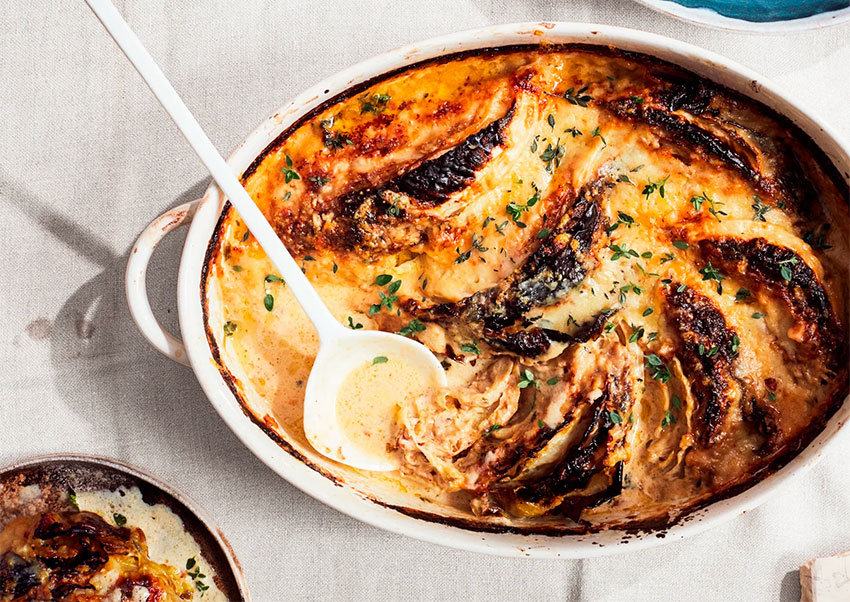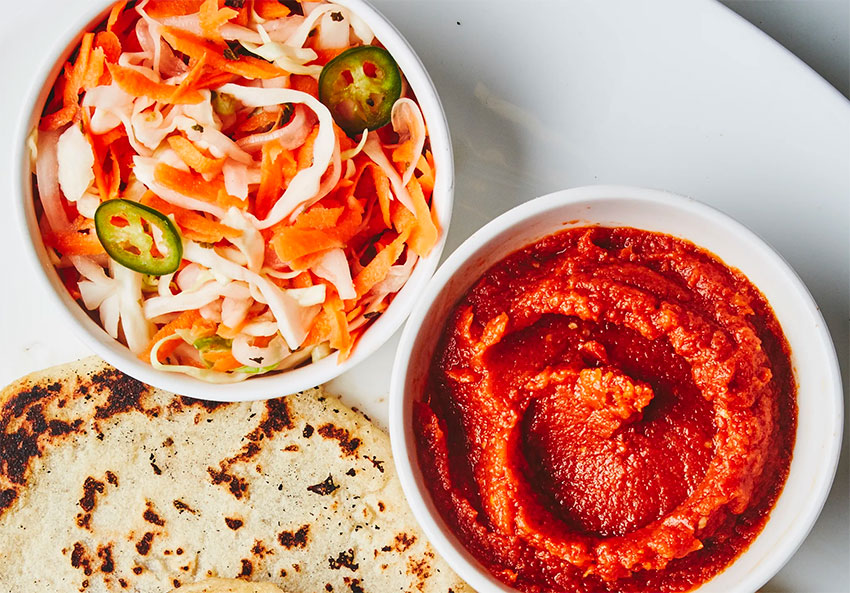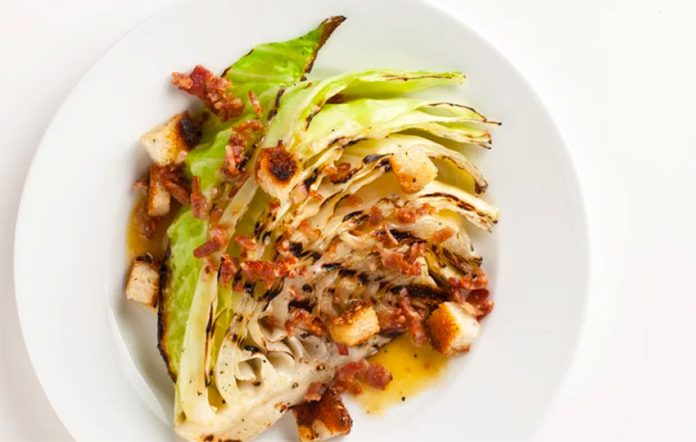One word of advice this week regarding mangos, the topic of the May 25th column. Enjoy them while they’re here because the season will soon be over. The wise ones among us will also be freezing chunks and purée to have in the fall and winter months when mangos are few and far between and not locally grown.
Now we can move on to something else that’s plentiful right now but not quite as popular: cabbage. I’ve been one of those people who use cabbage for cole slaw, salads and sometimes add it to soups, but rarely have I done much more with it.
But why not sauté it with a spicy sausage or chorizo for a breakfast scramble, venture into fermentation with a Salvadorean relish or bake it slowly with rich cheeses till it’s a decadent caramelized goo?
Cabbage, in all its forms, has been cultivated and eaten for thousands of years all over the world, and also valued for its medicinal qualities. High in vitamin C, sauerkraut was eaten by Scandinavian and German sailors to prevent scurvy on long voyages; European folk medicine touts cabbage as treatment for rheumatism, poisoning by mushrooms and as a laxative.
And here’s a tip for modern times from ancient Egypt: eating cooked cabbage at the start of a meal reduces the intoxicating effects of wine.
Choose a cabbage that’s firm, smells sweet and is fairly heavy. Raw cabbage is 92% water, so if it’s cut it should be crisp and somewhat juicy in a cabbage-way. Don’t worry if the outer green leaves have some holes in them; unless there’s moth damage to the head itself, those are leaves you won’t be eating anyway.
I love that in the mercado you can ask for half or even a quarter of a cabbage, and they’ll cut it for you on the spot. So if you want to make a basic cole slaw with half green and half purple cabbage, there’s no problem buying exactly how much you need. Cabbage is often unfairly criticized as having an unpleasant taste and odor when cooked, but in reality this only happens when it’s overcooked. That’s when it develops hydrogen sulfide gas, the cause of those disagreeable aspects.
The biggest cabbage ever grown? According to Guinness World Records one Scott A. Robb – already a record-holder for nine other gigantic vegetables – grew a 138.25 lb. green cabbage that he presented at the Alaska State Fair in 2012. To date, no one has broken that record.
Nancy’s Cole Slaw Especial
- ½ medium cabbage (about 1½ lbs.)
- 2 carrots, peeled and chopped or grated
- Chopped onion to taste
- 1/3 cup chopped cilantro
- ½ cup dried cranberries
Dressing:
- ¾-1 cup mayonnaise
- 2 Tbsp. apple cider vinegar
- 2 Tbsp. Dijon mustard
- 1 tsp. celery seeds (if available)
- Salt and pepper to taste
Core cabbage, remove outer leaves and chop or shred. Mix first 5 ingredients together, male dressing and mix. Refrigerate for at least an hour to blend flavors.
Cheesy Cabbage Gratin
This rich, flavorful dish will change your opinion of cabbage!
- 1 medium head of green cabbage (about 3½ lb. total), cut through core into 8 wedges
- 2 Tbsp. olive oil
- 2 shallots or 1 small yellow onion
- 4-6 garlic cloves
- 2 cups heavy cream
- Thyme or chives, fresh or dried
- 1 Tbsp. unsalted butter
- 3 oz. Gruyère, grated (about 1½ cups)
- ½ oz. Parmesan, finely grated (about ½ cup)
- Salt & freshly ground black pepper
- 1½ tsp. salt, plus more
Preheat oven to 350 F. Place cabbage on a baking sheet, drizzle with oil, salt and pepper. Roast until tender and edges are golden, 40-45 minutes. In a small saucepan, bring shallots, garlic, cream, 1 Tbsp. thyme, 1½ tsp. salt and 1 tsp. pepper to a simmer over low heat. Cook, stirring occasionally, until shallots and garlic are soft, 15–20 minutes. Let cool. Blend until smooth with food processor or blender.

Grease a 3-qt. shallow baking dish with butter. Arrange cabbage in dish so wedges are lying on a cut side; pour cream mixture over. Bake, uncovered, until cream thickens, 30–40 minutes. Let cool 30 minutes. Heat broiler. Sprinkle with Gruyère and Parmesan. Broil until cheese is bubbling and gratin is deeply browned, about 4 minutes. Sprinkle with thyme or chives. – bonapetit.com
Grilled Cabbage with Bacon
Simple but delicious.
- ½ small shallot or onion, minced
- 1 Tbsp. red wine vinegar
- 2 tsp. Dijon mustard
- 1 tsp. honey
- 6 slices bacon, cooked, 1 Tbsp. fat reserved
- ¼ cup olive oil, plus more
- Salt and pepper
- 1 head green cabbage, cut into quarters
- Croutons (for serving)
Whisk together shallot, vinegar, mustard and honey; gradually whisk in bacon fat and ¼ cup oil. Crumble in bacon; season with salt and pepper, set aside. Drizzle cabbage with oil; season with salt and pepper. Grill over medium heat or broil, turning occasionally, until tender and lightly charred, 15–18 minutes. Serve topped with vinaigrette and croutons.
Curtido (Salvadoran Cabbage Relish)
Consider this like a spicy, Latin American sauerkraut. Each day it ferments the flavors develop more and the better it tastes. Serve with chicken, on any kind of tacos or as a dip.
- ½ large head of red cabbage, thinly sliced
- 3 medium carrots, shredded
- ½ large white onion, thinly sliced
- 2 serrano chiles, seeds removed, thinly sliced
- 1 garlic clove, minced
- 2 tsp. dried oregano
- 5 tsp. (or more) kosher salt
- ¼ cup olive oil
- ¼ cup (or more) apple cider vinegar

Toss cabbage, carrots, onion, chiles, garlic, oregano and salt in large bowl. Let sit 30 minutes to wilt cabbage. Transfer to an airtight container and press down firmly to release juices; liquid should be at or above level of vegetables. Seal and let sit at room temperature at least 24 hours.
If serving after 24 hours, toss with oil and vinegar and season with salt, if needed. If serving after 48 hours, curtido will be tangy and may not need vinegar; toss with oil, then taste and season with salt and vinegar, if needed.
Janet Blaser of Mazatlán, Sinaloa, has been a writer, editor and storyteller her entire life and feels fortunate to write about great food, amazing places, fascinating people and unique events. Her work has appeared in numerous travel and expat publications as well as newspapers and magazines. Her first book, Why We Left: An Anthology of American Women Expats, is available on Amazon. Contact Janet or read her blog at whyweleftamerica.com.
